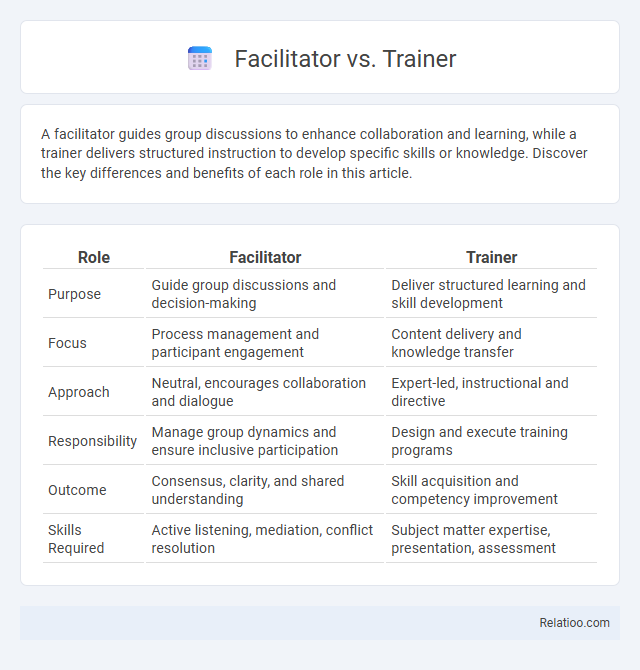A facilitator guides group discussions to enhance collaboration and learning, while a trainer delivers structured instruction to develop specific skills or knowledge. Discover the key differences and benefits of each role in this article.
Table of Comparison
| Role | Facilitator | Trainer |
|---|---|---|
| Purpose | Guide group discussions and decision-making | Deliver structured learning and skill development |
| Focus | Process management and participant engagement | Content delivery and knowledge transfer |
| Approach | Neutral, encourages collaboration and dialogue | Expert-led, instructional and directive |
| Responsibility | Manage group dynamics and ensure inclusive participation | Design and execute training programs |
| Outcome | Consensus, clarity, and shared understanding | Skill acquisition and competency improvement |
| Skills Required | Active listening, mediation, conflict resolution | Subject matter expertise, presentation, assessment |
Understanding the Roles: Facilitator vs Trainer
Understanding the roles of a facilitator and a trainer is essential for effective group engagement and learning. A facilitator guides discussions, encourages collaboration, and helps the group reach consensus without directly imparting knowledge, whereas a trainer delivers structured content aimed at skill development and knowledge transfer. Your choice between a facilitator and a trainer should depend on whether the goal is to foster group interaction or to teach specific competencies.
Core Responsibilities of a Facilitator
The core responsibilities of a Facilitator center on guiding group discussions, encouraging participation, and ensuring that meetings or workshops achieve their objectives by fostering collaboration and open communication. Unlike Trainers who focus on delivering content and developing skills, or Coaches who provide personalized guidance and performance feedback, Facilitators remain neutral, managing group dynamics and helping your team reach consensus effectively. Your success in any collaborative setting relies heavily on a skilled Facilitator's ability to create an inclusive environment that supports diverse perspectives and drives productive outcomes.
Key Functions of a Trainer
A trainer specializes in delivering structured learning experiences, focusing on skill development, knowledge transfer, and performance improvement through planned sessions, practical exercises, and assessments. They design training programs tailored to your needs, ensuring content relevance and measurable outcomes that enhance employee competence and organizational productivity. Unlike a facilitator who promotes open dialogue and group problem-solving, a trainer drives learning with authority on subject matter and clear instructional goals.
Approaches to Learning: Facilitation vs Training
Facilitation emphasizes learner-centered approaches, encouraging active participation, reflection, and collaboration to create shared understanding and empower Your group's problem-solving skills. Training focuses on instructor-led delivery, structured content, and skill acquisition through repetition and practice, aiming for measurable performance improvement. Facilitators adapt to group dynamics, fostering open dialogue, while trainers prioritize curriculum mastery and predefined learning outcomes.
Essential Skills for Facilitators
Essential skills for facilitators include active listening, effective communication, and conflict resolution, enabling them to guide group discussions and foster collaboration. Unlike trainers who deliver structured content and instructors who teach specific skills, facilitators create an environment where participants contribute and learn collectively. Mastery of group dynamics and adaptability are critical to ensure productive outcomes and enhance participant engagement.
Critical Competencies for Trainers
Critical competencies for trainers include deep subject matter expertise, strong communication skills, and the ability to adapt teaching methods to diverse learning styles. Trainers must effectively design and deliver content that promotes engagement and skill acquisition, ensuring your learning objectives are met. Unlike facilitators who guide group interactions and encourage participation, trainers are responsible for structured instruction and measurable outcomes.
Differences in Methodology and Delivery
Facilitators guide group processes by encouraging collaboration and open dialogue, using participatory techniques to foster collective problem-solving. Trainers deliver structured content through predefined curricula and expert-led sessions, focusing on skill acquisition and knowledge transfer. Your choice depends on whether you need a dynamic, interactive experience or a more formal, instructional approach tailored to specific learning outcomes.
When to Use a Facilitator vs a Trainer
Use a facilitator when guiding group discussions, decision-making, or collaborative problem-solving, as their role centers on enabling participation and fostering consensus. Choose a trainer when delivering structured knowledge transfer, skill development, or instructional content that requires clear learning objectives and assessment. Facilitators excel in dynamic, interactive sessions, while trainers are best suited for formal education and competency-building scenarios.
Impact on Participant Engagement
A facilitator fosters open dialogue and collaboration, creating an inclusive environment that empowers participants to actively contribute and engage. Trainers focus on delivering structured knowledge and skills with clear objectives, ensuring participants acquire specific competencies through instruction and practice. Your choice between a facilitator and trainer influences participant engagement by either promoting dynamic interaction or providing targeted learning outcomes, depending on your goals.
Choosing the Right Role for Your Needs
Choosing the right role between a facilitator, trainer, and coach depends on your specific objectives and the desired outcomes. A facilitator guides group discussions to foster collaboration and decision-making, while a trainer imparts specific skills and knowledge through structured learning sessions. A coach provides personalized support to enhance individual performance and personal growth, ensuring your needs align with the most effective development approach.

Infographic: Facilitator vs Trainer
 relatioo.com
relatioo.com